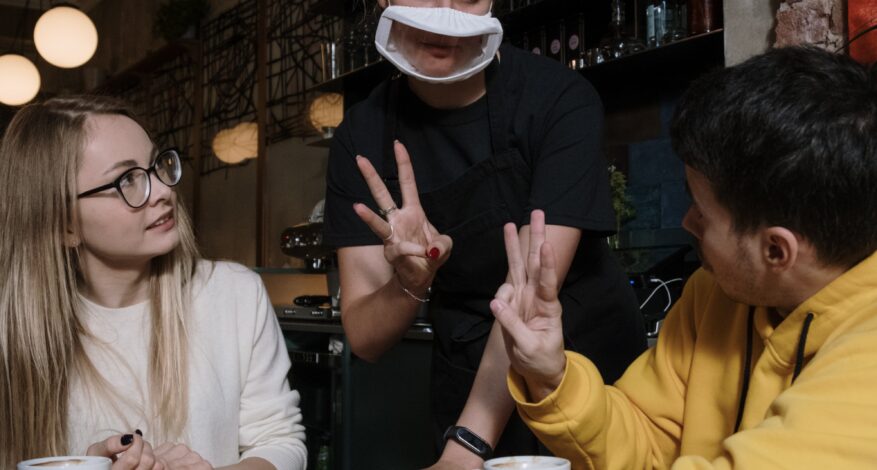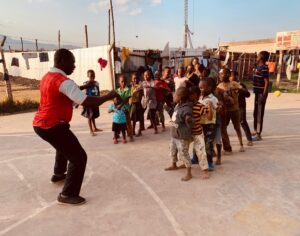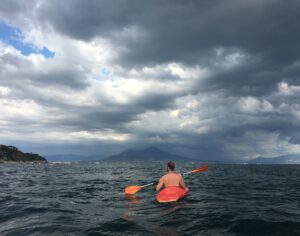BEING DEAF IN MODERN-DAY SOCIETY
How would you talk to your parents or friends if you were deaf? The answer is pretty straightforward: the most natural mean of communication for a hearing-impaired person is Sign Language, which conveys a message by employing hands and eyes, instead of voice and ears.
A WORLD TO BE SEEN
There are many prejudices associated with deafness. In fact, “deaf” is frequently considered as a synonym of “limited”, even of “dumb” sometimes. And yet, deaf people can become any person they want to be: actors, poets, writers, teachers, scholars… And they can learn to speak too.
However, despite the existence of countless Sign Languages around the world, many of these have not been officially recognized by the law, yet. As a consequence, local Deaf communities and their cultures are forgotten by the society of hearing people. Nonetheless, the situation varies across the countries, as it is shown by the following comparison between the US and Italy.
AN AMERICAN SCENARIO
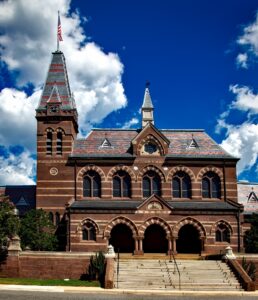 In the United States, there is no language that is recognised as the official one, “whether signed or spoken”. And yet, American Sign Language (ASL) is taught in Universities and schools and, in some states, it has the same reputation that a foreign language has. Moreover, in Washington D.C., the Gallaudet University appears to be “the world’s only university specifically accommodated for deaf and hard of hearing students”. Indeed, every lecture is dispensed in ASL and the rooms are specifically designed for signers. The first studies on Sign Language were carried out here in the 1960s. Then, they served as a model for further research.
In the United States, there is no language that is recognised as the official one, “whether signed or spoken”. And yet, American Sign Language (ASL) is taught in Universities and schools and, in some states, it has the same reputation that a foreign language has. Moreover, in Washington D.C., the Gallaudet University appears to be “the world’s only university specifically accommodated for deaf and hard of hearing students”. Indeed, every lecture is dispensed in ASL and the rooms are specifically designed for signers. The first studies on Sign Language were carried out here in the 1960s. Then, they served as a model for further research.
What is more, ASL is present in some American TV shows and movies, such as Switched at Birth, A Quiet Place, or the very new Netflix program Deaf U. Besides, the theatre company Deaf West, which organizes shows in ASL, managed to make it to Broadway and to be nominated for some prestigious awards.
THE ITALIAN STATE OF AFFAIRS
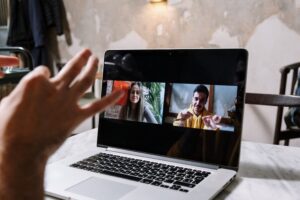 Italian Sign Language (LIS) does not have the same status that spoken Italian or any foreign language has. It has not been recognised by the law, and, throughout the whole country, only the Ca’ Foscari University (Venice) offers multiple courses regarding deaf studies. In spite of the amount of research carried out so far, much information on the Italian Deaf community is inadequate and confusing. This leads to a serious lack of services; deaf people often experience a hard time when in hospitals, administration offices, and in many other contexts where the interlocutor is a non-signer.
Italian Sign Language (LIS) does not have the same status that spoken Italian or any foreign language has. It has not been recognised by the law, and, throughout the whole country, only the Ca’ Foscari University (Venice) offers multiple courses regarding deaf studies. In spite of the amount of research carried out so far, much information on the Italian Deaf community is inadequate and confusing. This leads to a serious lack of services; deaf people often experience a hard time when in hospitals, administration offices, and in many other contexts where the interlocutor is a non-signer.
Fortunately, some TV shows and programs are broadcast in LIS as well as Italian (such as the News or the latest Festival di Sanremo) and, since the Covid-19 pandemic outbreak, political conferences and speeches have been simultaneously translated by professional interpreters. This helped to raise people’s awareness of the existence of a Deaf community. Furthermore, Italian Sign language, along with Japanese Sign Language (JSL) and ASL, is present in a film called “Sign Gene”. This movie was entirely shot by deaf people and tells the story of some deaf heroes who obtain their superpowers from signs.
A CHANGE OF PERSPECTIVE
As far as the inclusion of Deaf communities is concerned, it is clear that some countries are more advanced than others. Spreading the correct information and making it easily accessible to everybody could raise awareness on the existence of Deaf communities and Sign Languages around the world. In this way, barriers between hearing and deaf individuals would break down and more people would be introduced to the world of seeing instead of hearing. According to deaf Oscar-winner actress Marlee Matlin: “Every one of us is different in some way, but for those of us who are more different, we have to put more effort into convincing the less different that we can do the same thing they can, just differently.” So, remember to stay informed and put yourself in someone else’s shoes if you are willing to discover their world. The Deaf might be a minority, but, as such, they have their own poetry, films, plays, books, history, and language, which need to be acknowledged and respected.

